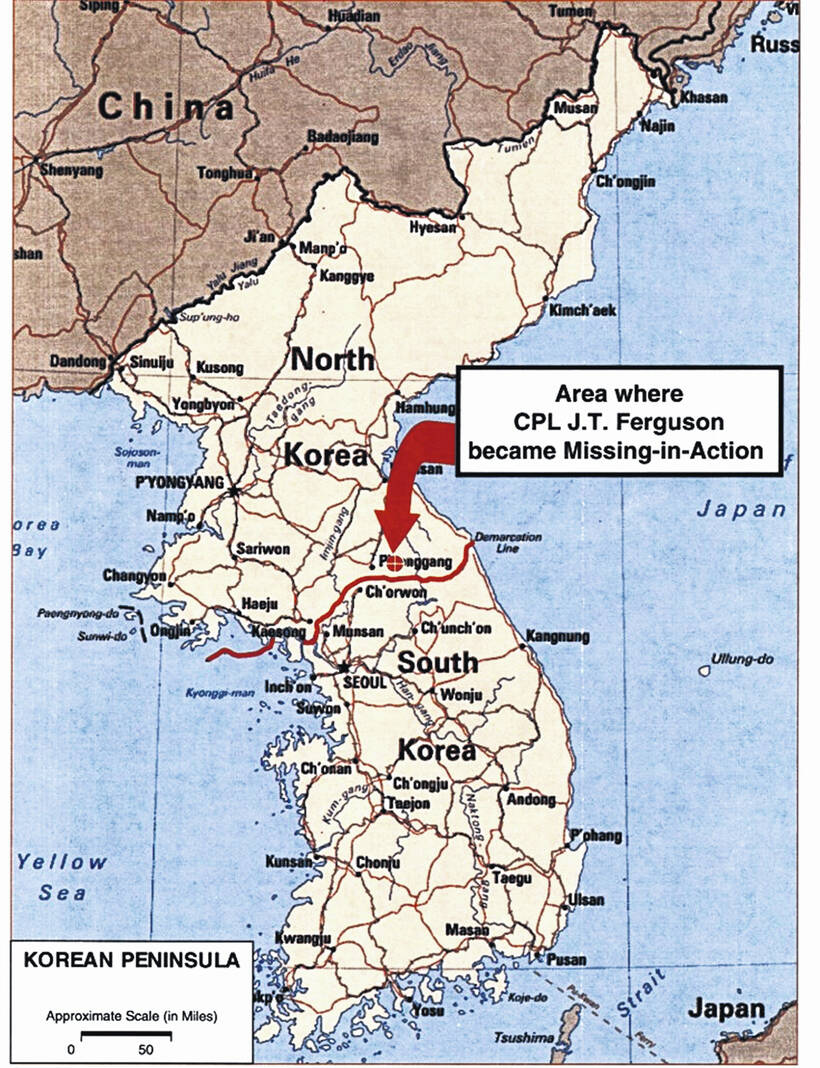
This map of the Korean peninsula shows were James Ferguson first went missing and subsequently was believed to have died.
Provided photos

James Ferguson
Provided photos

By Vivian Blevins
Contributing Columnist
One of those dreaded letters arrived on June 30, 1952, to Mr. and Mrs. James Ferguson about their son, Jim, a U.S. Army infantryman and corporal in the Korean War. He was missing in action, i.e., MIA. The sender, Major General William Bergin, indicated in the letter that the term missing in action is “used only to indicate that the whereabouts or status of an individual is not immediately known.”
At the time of his disappearance and death on June 17, 1952, Ferguson, age 22, was on patrol in the Iron Triangle of North Korea three weeks before he was to be rotated home. A letter from one of his comrades in arms, William H. Sellers, sent to Ferguson’s mother 50 years later, indicates Sellers’ sense her son’s mission, “A lot of the guys thought it showed poor leadership from the top brass to send another patrol to the same area three nights later.”
Ferguson was a twin, and when his twin sister, Joan Buckley, who passed in 2014, learned that her brother’s status was no longer MIA but KIA , i.e., killed in action, she and her daughter, Pam Gilbert, were with the family when Ferguson’s father answered the door to two uniformed officers who handed him a letter and waited until he read it. Gilbert of Greenville, Ohio, an American Sign Language instructor at Edison State Community College, reports that the family fell apart, and her grandmother, Ferguson’s mother, took her into the kitchen to read her a story from one of the popular Little Golden books. Gilbert was four years old at the time, but she recalls that her grandmother was so filled with grief that she was unable to finish reading the book.
In a note in the scrapbook provided by Gilbert, Ferguson’s mother Pamela, who passed on 1973, details her son’s successes on the basketball court and the baseball field (He was 6’ 4” tall according to military records) and writes, “Jim never drank or smoked or swore.” Reports are that he had a promising career in the pros but felt that first he needed to serve his country.
Ferguson was awarded the Silver Star posthumously on Dec. 28, 1952, for “extraordinary heroism, fearlessness, and complete selflessness devotion to duty.” The description in the citation indicates that on June 17, 1952, Ferguson, while leading a patrol, demonstrated his complete disregard for his personal safety and shouted a warning to his comrades behind him, enabling the other members of his patrol to take cover but disclosing his location to the enemy forces.
When U.S. President Dwight D. Eisenhower awarded Ferguson the Purple Heart, he said, “In grateful memory of Corp. J. T. Ferguson, who died in the service of his country in the military operations in Korea. He stands in the Unbroken Line of Patriots who have dared to Die that Freedom might live and grow and increase its blessing. Freedom lives and through it he lives in a way that humbles the undertaking of most men.”
In 1954 Ferguson’s mother, Pamela Ferguson, wrote “He Lives Again”: Part I “’Missing in Action’ the telegram read/Somewhere near Kumsong/This was his day of glory/This boy I was proud to call ‘Son.’ Part II I see him coming up the walk/ Two steps at a time/As he lives again in memory/This tall young son of mine. Part III I stand before his picture/He smiles at me and then/Time stands still these precious moments/When my boy lives again. Part IV In other minds he may not live/To walk this earth among men/But each time his name is spoken/ Then my boy lives again.”
What is left of Ferguson’s family has waited and waited and waited, with no success, for his remains to be shipped home.
To honor Jim’s mother’s words, I ask that you say her son’s name aloud, again and again.




